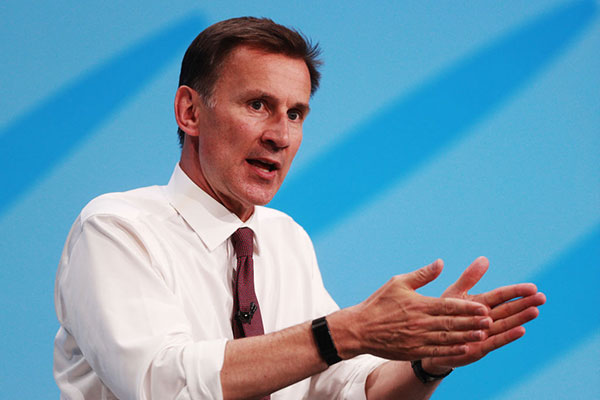Spring Budget 2023 preview: 10 things to watch out for
1st March 2023 12:13
by Alice Guy from interactive investor
Jeremy Hunt will need to tread carefully to keep voters happy but still balance the books, says Alice Guy.

With an election likely in late 2024 and the Conservatives lagging in the polls, could we start to see some tax giveaways in the Spring Budget?
The chancellor, Jeremy Hunt, does have money to play with as the Treasury received more taxes than expected in January, with the highest self-assessed income tax receipts since records began, leaving a £5.4 billion budget surplus. Government borrowing so far this tax year is £30.6 billion less than predicted by the Office for Budget Responsibility (OBR) as recently as November.
- Invest with ii: Open a Stocks & Shares ISA | ISA Investment Ideas | Transfer a Stocks & Shares ISA
Martin Beck, chief economic adviser to the forecasting group EY ITEM Club, commented that the record tax take gave Mr Hunt “some positives to work on” in his Spring Budget, as falling wholesale energy prices meant the support package cost a lot less than expected.
But despite the encouraging headlines, some experts warn that big tax giveaways are unlikely as the government’s unexpected revenue boost is only temporary. In the medium term, the government still needs to meet its self-imposed fiscal rules, despite an economic slowdown.
Isabel Stockton, senior research economist at the Institute for Fiscal Studies (IFS), says that: “Short-term savings cannot finance permanently higher spending...the chancellor likely has less fiscal room for manoeuvre than recent headlines might suggest.”
So, with limited options for big giveaways, Hunt will need to tread carefully to keep his voters happy but still balance the books. Here are 10 key areas where the chancellor might make changes:
Personal taxes
1) Energy cap
Average energy bills are due to soar in April from £2,100 to £3,000 per year, a monthly rise of £75. The increase is due to the ending of the government’s £400 energy support package in March and an increased energy price guarantee from April.
Extending the support package would be a popular move and could be less expensive than originally feared. As wholesale gas prices are already falling, any additional support package may only need to continue until the summer, when industry regulator Ofgem’s price cap is expected to drop back to around £2,154. However, Hunt has already indicated that any extra support will be targeted at poorer households, so it’s unlikely to be offered to everyone.
2) Lifetime allowance
Jeremy Hunt is coming under pressure to consider raising the lifetime allowance on pensions, which has been stuck at £1,073,100 for many years. This limit is causing issues with some senior doctors and public officials, often with generous pension schemes, retiring early to avoid a big tax charge.
- Chancellor Jeremy Hunt gives thought to 55% pension tax charge
- Use this fab tax trick to boost your pension wealth
Hunt may decide to increase the current £40,000 annual pension allowance or the lifetime allowance limit on pension fund values. However, any changes will affect tax revenues, so reductions to other tax reliefs may be considered to balance the cost.
3) High income child benefit tax charge
The high income child benefit tax charge has come under fire in recent months, as wage inflation drags more families over the £50,000 threshold. Current rules mean that any household with someone earning over £50,000 will see some of their child benefit removed, although this can be mitigated with extra pension or gift aid payments.
Raising the £50,000 threshold would be a relatively easy way to win some brownie points with core voters, so this is a real possibility.
4) ISAs
ISAs are currently one of the best ways to protect your wealth from the taxman, but there are rumours that the current ISA regime may be reconsidered.
Like the lifetime allowance for pensions, it’s possible that Hunt will cap the amount you can save overall in an ISA during your lifetime. Any new measure wouldn’t affect modest ISA savers, but could impact those who’ve amassed considerable wealth in their ISAs.
Simplifying the ISA rules is one way the government could arguably improve the current system. There are currently five different ISA wrappers, from straightforward stocks & shares and cash ISAs, through to Help to Buy, Lifetime, and Innovate Finance ISAs. Simplifying this complex system could make it easier for newer investors to make investment decisions.
5) Inheritance tax
Despite being one of Britain’s most-hated taxes, inheritance tax actually raises a relatively small amount for the Treasury. But that’s probably no comfort when you’re facing a big inheritance tax bill.
Just like ISAs, tinkering with the rules over the years has led to a hugely complex system with multiple different reliefs and exemptions and rules that are extremely hard to understand. It is possible that Hunt will consider a simpler regime where some reliefs and exemptions are combined.
Arguably, inheritance tax thresholds, which have been frozen for years, are due an uplift, but big change is probably unlikely. The government’s tax-raising measure of choice is so-called fiscal drag (where more taxpayers are caught by a tax charge because inflation has driven wages higher but tax thresholds have stayed the same), so it seems a fair bet that the current threshold will remain in place for the time being.
6) Non-doms
Making it harder for non-doms to avoid tax would potentially be a popular move, but could make the UK less attractive for foreign potential residents.
The Labour Party plans to abolish non-dom status, so there was speculation ahead of the Autumn Statement that tax changes for non-UK domiciled individuals might be proposed. Immediate changes on this complex issue seem unlikely, but the announcement of a future consultation is possible.

Business taxes
7) Energy windfall taxes
Energy windfall taxes have raised a lot less than expected and it’s not a good look, especially given the eye-watering energy bills faced by British households. It is possible that Hunt will consider tightening the current regime to force energy firms to cough up more.
8) Tax avoidance clampdown for offshore companies
Just like private non-doms, it’s a constant annoyance for many Britons that foreign companies such as Amazon often pay so little tax in the UK.
Tightening the rules would probably be a popular measure if Jeremy Hunt can find the right way to do it without significantly affecting the UK economy.
Other
9) Childcare costs
With the government actively considering ways to get more of us back to work, improving the ultra-expensive childcare situation could be another way for Hunt to help out hard-working families. According to a recent survey, commissioned by childcare providers, 70% of parents to young children said they would work more if free childcare was available.
The Treasury has already rejected the option of extending 30 hours of free childcare to one- and two-year-olds in England, as it would cost around £6 billion. However, officials are thought to be examining cheaper options. One idea already under consideration is giving workers the legal right to ask for flexible working from their first day in a job rather than after six months.
10) Public sector pay
Last but not least, with a record tax take and a budget surplus of £5.4 billion, it’s become increasingly difficult for the government to be overly stingy with public sector pay rises. Hunt will come under pressure to raise public sector pay by more than the average of 5% already offered to nurses, teachers and other public sector workers.
However, pay rises are a long-term commitment as future pay will build on any increases offered. With the economic situation still uncertain, it’s likely that some workers will still be disappointed with pay rises below their expectations.
These articles are provided for information purposes only. Occasionally, an opinion about whether to buy or sell a specific investment may be provided by third parties. The content is not intended to be a personal recommendation to buy or sell any financial instrument or product, or to adopt any investment strategy as it is not provided based on an assessment of your investing knowledge and experience, your financial situation or your investment objectives. The value of your investments, and the income derived from them, may go down as well as up. You may not get back all the money that you invest. The investments referred to in this article may not be suitable for all investors, and if in doubt, an investor should seek advice from a qualified investment adviser.
Full performance can be found on the company or index summary page on the interactive investor website. Simply click on the company's or index name highlighted in the article.